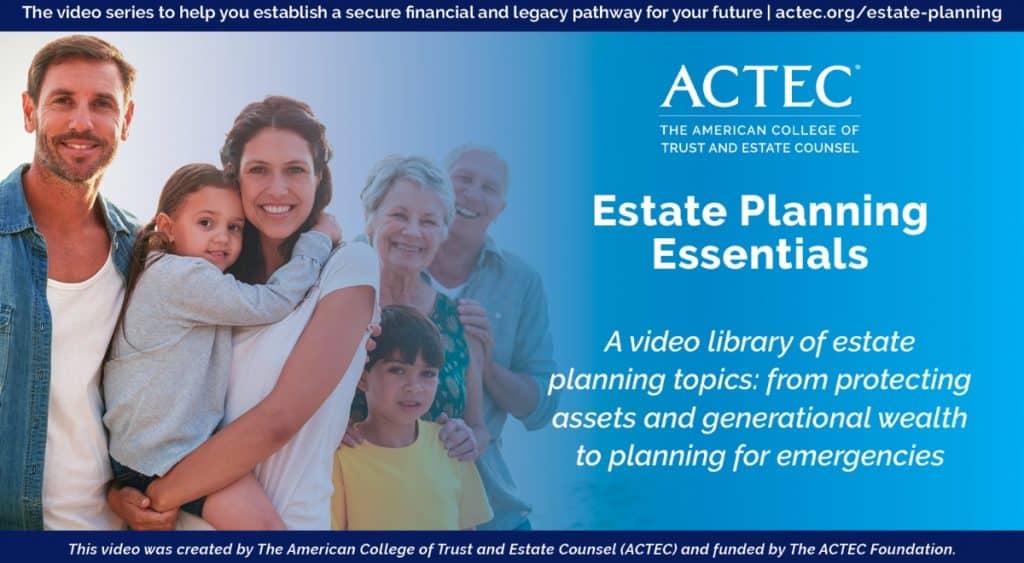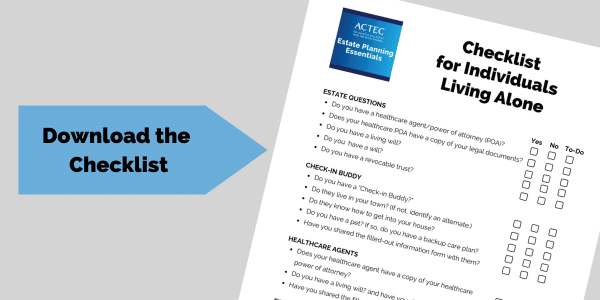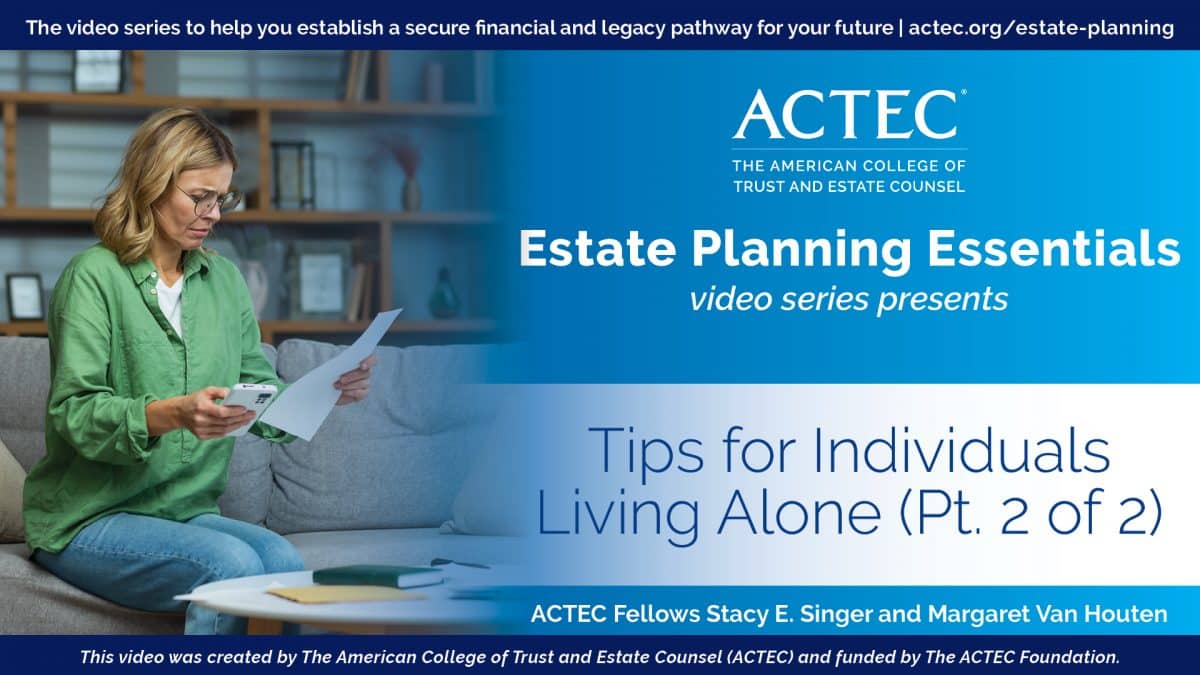According to the U.S. Census Bureau, in 2021, 15% of adults over 18 live alone. Preparing for emergencies when living alone is essential to ensure your safety and well-being because you may not have immediate assistance readily available. Having an emergency plan, supplies, and communication strategies in place can significantly increase your ability to cope with unexpected situations and respond effectively.
ACTEC Fellows Stacy E. Singer and Margaret Van Houten offer suggestions to individuals in this two-part video series. Part 1 provides recommendations such as a “Check-in Buddy,” and details the kind of information to share in advance of an emergency.
Transcript
Hi, my name is Stacy Singer. I’m an ACTEC Fellow from Chicago, Illinois and I’m here with Margaret Van Houten, an ACTEC Fellow from Des Moines, Iowa.
This is part 1 of a 2-part series for individuals living alone and their families. This video will discuss the concerns with living alone, and part 2 will offer more safety and legal recommendations.
This video is specifically for those of you who live alone or have a loved one who lives alone.
Margaret, thank you for joining us. Could you tell us about yourself and why this topic interests you?
Margaret Van Houten: Hi Stacy, it’s good to see you. Over the last many years, I have helped my clients to craft and implement their estate plans, including their wills, trusts, and financial and healthcare powers of attorneys.
I knew and addressed the particular difficulties a single person faced in choosing beneficiaries and agents but only occasionally worried about whether that client was prepared for a health emergency or accident.
That changed for me almost two years ago, though, when I had a serious health scare and I live alone. Luckily, my two wonderful friends, Sheila and Bev, worried about me, came to my home, found me unresponsive and called 911.
Happily, I got the appropriate care, recovered with the help of my daughter and friends, and am now fully recovered, but I wish I could have done something to spare my daughter, my friends, my family, and myself that whole process.
The whole purpose of this video is to give some possible tips for successfully planning for a health emergency and its aftermath if you or a loved one lives alone.
People Living Alone in the United States
Stacy: Margaret, thank you so much for sharing that and maybe you can give us some context. How many people live alone in the U.S.?
Margaret Van Houten: According to the U.S. Census Bureau, in 2021, 15% of adults over age 18 live alone.
That number increases when you look at an older group of people. In 2021, 37 million people or 28% of adults age 60 and over, live alone, up from 13% in 1960. These increased numbers from that time are likely attributable to extended life expectancy as well as lifestyle changes.
Stacy: Tell me, why is your safety and your estate and legal planning different for those who live alone than those who don’t?
Margaret: The main and most important difference is that if you do not live alone and you have a health emergency, someone in your household will most likely find out about it quickly and call 911. If you live alone, that might not be the case.
And, if you live alone or live with minor children, it is possible that you could have all of the best estate planning documents in the world – health care and financial powers of attorney, letters of direction, listings of assets and anything other you can think of – but no one else may know about them or how to find them, as would likely be the case if you lived with someone else.
Stacy Singer: Okay, you have my attention. What can someone do to protect themself in case of injury or a health emergency if they live alone?
Margaret Van Houten: The possibility of an injury or health emergency does increase as we age, but I want to make sure that everyone knows that you do not need to be a senior citizen or incompetent, to run a risk of not receiving timely medical treatment when you need it. So, I want everybody who lives alone to think about this, even if they’re youngsters.
Stacy Singer: So, what can you do, regardless of your age?
Check-in Buddy for Individuals Living Alone
The first thing I would suggest is to get what I call a “Check-in Buddy,” someone you trust, who you can check in with every morning or every day. It could be an adult child, a friend or neighbor, or a co-worker, even your mother. I now contact my daughter every morning by text.
The person who you name, however, needs to have certain qualities. That person needs to:
- Be available to receive a call or text most days. Do not choose your friend or relative who leaves their phone in their car most of the time or who views charging their phone as an optional activity. They do not need to sleep with the phone by their ear unless they already do that.
- Be someone you trust with access to your home and who will not lose your key or access code.
- Be willing to maintain contact information about you, your family and your medical professionals.
- And you know, of course, that not only is your buddy ‘your’ safety net, but you are doing that for them as well, if they live alone.
- It is good if the Check-in Buddy lives in your town. But if, like me, she isn’t, the buddy should have the name of someone who can come to your home and check on you before calling emergency.
Stacy Singer: What information does your Check-in Buddy need to have?
Margaret Van Houten: Your buddy needs to have:
- A key or access code to your house, and if you have an alarm system, your alarm code. If you have a neighbor with a key, be sure to connect your buddy with your neighbor so that each can contact the other if worried about you.
- If your buddy is NOT your healthcare agent, you should give your buddy and your agent each other’s contact information.
- Your Check-in Buddy should know where you keep your insurance cards
- Your Check-in Buddy should know what hospital you want to go to in case you get sick. The EMTs will not be required to take you to that facility, but I think they will try to accommodate you, if they can.
- If you have pets, make a plan and tell your buddy your plan about who should be called such as a vet, boarding facility, or very nice friend to take care of your pets, if you’re away.
Alternatives to a Check-in Buddy
Stacy Singer: I love that last one as a person who has two dogs. Do you recommend any other alternatives to a Check-in Buddy if there isn’t someone to fill that role?
Margaret Van Houten: I think there are other options. Some people just do not want to have a buddy, and I think it’s their right. There are other alternatives.
You can contact your employer. Or tell your employer that if you do not show up at work, any time you’re supposed to be there, someone can contact your emergency contact. I don’t think this is a good option, but it is something.
Medical Alert Devices, like the “I am falling and can’t get up” gadget, which my mother had when she was quite elderly. Of course, she would fall and then would “not want to bother” the nice people at the other end of the line until morning. Also, the newer devices are very good. The newer Apple Watches can detect a fall and make calls. There are many things that are the equivalent of a road service, like “On-Star.”
Also, there is a free app called Snug Safety – snugsafe.com – you check in daily by pressing a button on the app, and if you do not contact them, they contact you, first by text and then by phone. If you do not answer, they call your emergency contact and if they do not respond, then they call 911. I am sure there are other similar apps as well.
I also suggest, in any case, an “In Case of Emergency” (ICE) contact in your phone. If you have a screen lock on your phone, you can give that code to your agent (if that is authorized by your employer).
Stacy: Margaret, thanks so much for all of this great information. I want to encourage everyone who is watching to visit actec.org/estate-planning/livingalone for a checklist of information to give your Check-in Buddy.
Stay tuned for the next part about how to make sure your finances and legal affairs are well taken care if you become incapacitated for more than a few days. Margaret, thanks again for joining us.
You may also be interested in:
Featured Video
Tips for Individuals Living Alone (Pt. 2 of 2)
Lawyers share tips for individuals living alone on planning for incapacity or illness and provide a review of critical power of attorney documents.
ACTEC Estate Planning Essentials

ACTEC Fellows provide answers to frequently asked trust and estate planning questions in this video series.




